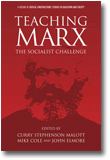
Teaching Marx
The Socialist Challenge
Edited by:
Curry Malott, West Chester University of Pennsylvania
John M. Elmore, West Chester University of Pennsylvania
Mike Cole, Bishop Grosseteste University College Lincoln
A volume in the series: Critical Constructions: Studies on Education and Society. Editor(s): Brad J. Porfilio, California State University, Stanislaus. Marc Pruyn, Monash University. Derek R. Ford, DePauw University.
Published 2013
We are in the midst of yet another global crisis in capitalism. In the UK, we have the most right wing and ideologically driven government since Thatcher; a ruthless cabal of millionaires intent on destroying the welfare state. In the US, President Obama, whose initial record did not live up to the expectations of many on the Left, is increasingly driven by right-wing republicanism and other corporate interests. At the same time, there are developments in Latin America, in particular Venezuela, which are heralding the dawn of a new politics, and recovering the voice of Marx, but with a twenty-first century socialist focus, thus giving hope to the lives of millions of working people throughout the world. This is why the world media is intent on discrediting President Hugo Chávez; and insisting that ordinary people have to pay the cost of the crisis in capitalism. The Arab Spring and the Occupy movement also show signs of an anti-capitalist movement in embryo. In Greece, perhaps more than anywhere else in Europe (even France), the austerity-stricken working-classes are pushing for real existing socialism. It is therefore not surprising that the ruling class of Greece is increasingly supporting the neo-Nazi, fascist Golden Dawn party threatening civil war should they lose power as a class. Now is a prescient time to bring twenty-first century socialism to the educational institutions of the world, to teach Marx across the curriculum and across the globe.
Through this volume our goal was to contribute to the literature by concretely demonstrating the practical implications of Marx’s theory to curriculum. However, while this book provides concrete examples of how Marx can and has informed a revolutionary critical education, it is not intended to be prescriptive. That is, the chapters should not be read as a how to guide, but they should be taken as inspiration for new, creative approaches to Teaching Marx and interpreting and posing The Socialist Challenge.
CONTENTS
Foreword: Curry Stephenson Malott, Mike Cole, and John M. Elmore. Introduction: Rethinking Educational Purpose: The socialist challenge, Curry Stephenson Malott. SECTION I: THE LARGER CONTEXT Chapter 1: Marx, Marxism and (twenty-first century) socialism, Mike Cole. Chapter 2: The Crisis in Marxism: Language, Agency, and the Problem of Marx’s Authorial Voice, Brad Hollingshead. Chapter 3: Class Consciousness and Teacher Education: The Socialist Challenge and The Historical Context, Curry Stephenson Malott. SECTION II: A MARXIST CHALLENGE TO CAPITALIST SCHOOLING Chapter 4: Marx, Teacher Education, and the Corporate University, John M. Elmore. Chapter 5: Critical Multicultural Social Studies and the Socialist Challenge, Marc Pruyn and Curry Stephenson Malott. Chapter 6: “Shut up. He might hear you!” Teaching Marx in Social Studies Education, E. Wayne Ross and Greg Queen. Chapter 7: Seeking liberatory possibilities in Science Education, Andrew Gilbert. SECTION III: SOCIAL CLASS AND STUDENT PERSPECTIVE Chapter 8: “Class” Discussion: social class, communication and the classroom environment, Carrie Freie. Chapter 9: Student-Teaching as an Emerging Marxist, Eric Gerard Anderson. SECTION IV: TWENTY FIRST CENTURY SOCIALISM IN PRACTICE Chapter 10: The Role of Higher Education Within the Socialist Revolution of Latin America, John M. Elmore. Chapter 11: Twenty- First- Century Socialism and Education in the Bolivarian Republic of Venezuela: An alternative to the neoliberal model, Mike Cole. Afterword: Teaching Marx in the Neoliberal Age, John M. Elmore.
-
Paperback9781623961206
Web price: $45.04 (Reg. 52.99)
-
Hardcover9781623961213
Web price: $80.74 (Reg. 94.99)
- eBook9781623961220

- EDU037000 - EDUCATION: Research
- EDU032000 - EDUCATION: Leadership
- POL005000 - POLITICAL SCIENCE: Political Ideologies: Communism, Post-Communism & Socialism
-
 DIY Punk as Education
From Mis‐education to Educative Healing
DIY Punk as Education
From Mis‐education to Educative Healing
-
 Imagining Education
Beyond the Logic Of Global Neoliberal Capitalism
Imagining Education
Beyond the Logic Of Global Neoliberal Capitalism
-
 Multiculturalism, Dialectical Thought, and Social Justice Pedagogy
A Study from the Borderlands
Multiculturalism, Dialectical Thought, and Social Justice Pedagogy
A Study from the Borderlands
-
 Read Aloud Handbook for Native American Children
Read Aloud Handbook for Native American Children
-
 Rethinking Social Studies
Critical Pedagogy in Pursuit of Dangerous Citizenship
Rethinking Social Studies
Critical Pedagogy in Pursuit of Dangerous Citizenship
-
 The 2017 Hampton Reader
Selected Essays from a Working-class Think Tank
The 2017 Hampton Reader
Selected Essays from a Working-class Think Tank
-
 The Luso-Anarchist Reader
The Origins of Anarchism in Portugal and Brazil
The Luso-Anarchist Reader
The Origins of Anarchism in Portugal and Brazil

